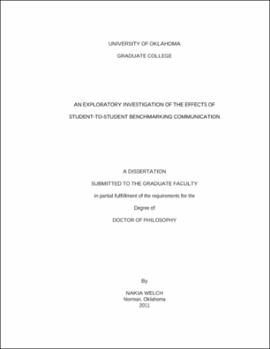| dc.description.abstract | Almost certainly, students communicate with each other about course-related material, particularly about exam performance. However, what is less well understood is how often student-to-student communication occurs, when it occurs, and the effects these interactions may have. There were three goals of this study: to (a) collect descriptive data concerning student to student communication behaviors, (b) study the effects of student benchmarking communication behaviors on student motivation and state self-esteem, and (c) study if and how grade discussion results in deception. College students (N = 539) completed questionnaires about student-to-student communication behaviors, followed by an experiment that positioned students in a hypothetical first-person narrative scenario where they received a grade of A, C, or F on an exam in a class in their major; after class, the student engaged in a discussion about grade performance with three other peers from the class who were either close friends or schoolmates and who all reported scoring either A's, C's, or F's on the exam. Student motivation to prepare for a future exam and state self-esteem were measured to determine the effects of this grade communication. Finally, students were asked what grade they would report when prompted by their peers, which indicated whether or not students would lie. Results indicated students most frequently communicate with acquaintances and close friends about course material during and immediately prior to class. This communication about course-related material occurs more often with those who the student feels close to, such as a friend, and less often with those who the student feels distant from, such as a stranger. Students also reported the purpose of communicating with others about course-related topics was to share information with others about class, either as an information seeker or information sharer. Ninety five percent of students confirmed grade discussion was a topic of student-student communication. Two factorial ANOVAs indicated main effects for student grade on motivation and state self-esteem. However, this experiment was unable to support the notion that peer discussion of grades affects student motivation or state self-esteem. Another factorial ANOVA indicated interaction effects and main effects of student grade on deception. This study partially confirmed that grade and grade discussion has an effect on deception. Major contributions of this research are (a) verification through systematic research that students communicate with other students concerning course-related topics, including grades, (b) the grade a student receives affects his/her motivation and state self-esteem, and (c) the grade and peer communication about grades affects the likelihood a student attempts to deceive others about his/her grades. Thus, results provide a picture of student-student benchmarking communication as common, complex, and sometimes deceitful. Student-student grade discussions are complicated social situations that can impact individual students both personally and academically and affect relationships between and among students. | |
